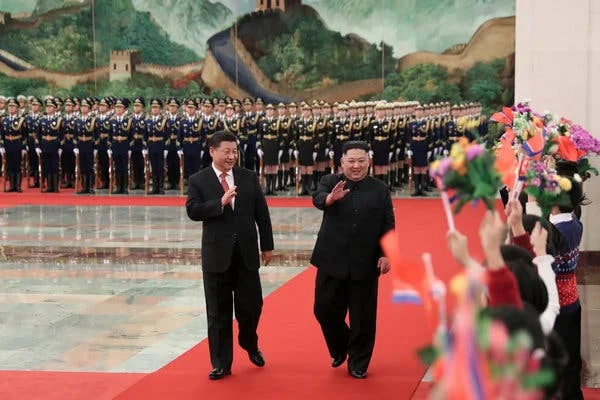Reaffirmation of China-DPRK Alliance: Xi Jinping’s Visit to North Korea By Jun Kwon and Sung Jang
Xi Jinping recently held a two day visit to North Korea in his capacity as the President of China. He visited North Korea once before as the Vice President many years ago. Xi Jinping’s visit to North Korea marks the first time that a foreign head of state or government has travelled to North Korea under the reign of Kim Jong-un.
While it is not uncommon for North Korea and China to have communicative exchanges, Xi Jinping’s visit has a greater level of symbolism than the former. Considering that North Korea has always known that China acts as its prime backer in international relations, one must then ask why Xi Jinping has chosen to visit North Korea at this particular moment.
It is no secret that the relations between China and North Korea have soured under Xi Jinping. While China has traditionally been a staunch ally to North Korea, even until this day, North Korea’s belligerence with nuclear weapons development has been an inconvenience of Xi Jinping. As Xi Jinping’s vision for China is to become more integrated into the world economy and has more prestige than before, North Korea’s attitudes towards international law and cooperation remained unchanged. As such, under the banner of pragmatism, international prestige, and economic development, China has sought closer ties with South Korea as seen by former President Park Geun-hye’s first trip abroad being to China, and the West.
Photo by Huang Jingwen/Xinhua
This visit from Xi Jinping is most likely meant to repair the relations between China and North Korea and to reaffirm and their alliance. There are a handful of important factors of why Xi Jinping has chosen to stage a state visit to North Korea.
The primary motivating factor that pushed Xi Jinping to visit North Korea may be due to the U.S.-North Korean nuclear negotiations. While previous U.S. presidents have been predictable in their foreign policy, Donald Trump’s unorthodox approach may be worrying China. Trump’s embracement of foreign authoritarian leaders such as Kim Jon Un, combined with North Korea’s willingness to forge relations with the U.S. in order to be integrated into the international system may be a sign of China’s loosening grip on North Korea. Xi Jinping’s visit to North Korea is surely aimed to restore and reaffirm their longstanding relationship between the countries.
Secondly, Xi Jinping’s visit to North Korea may be viewed as China giving a positive response to North Korea’s policy shift from Byungjin politics to prioritize economic development. During the period of Kim Jong Un’s regime consolidation, the execution of his uncle Jang Song Taek most irritated the Chinese as Jang was a reformer who wished to change the economic trajectory of North Korea into one that was closer to China’s.
Regardless of whether the reason behind the execution was due to political ideology, economic ideology, or simply a purge to signal a new incoming leader, the symbolism of such act was nevertheless damaging to Chinese-North Korean relations. However, as North Korea is pursuing an agenda of economic development and some form of controlled capitalism under the state, this is much more in line with Xi Jinping’s China and therefore is a ground for a common point of contact and identity between the two states. China really wants to propagate that prosperous North Korea could serve as living proof of the success that the Chinese model of socialism (socialism with Chinese characteristics) can have for other countries.
Photo by Japan Times
Finally, with the subsequent G20 meeting in Japan, Xi Jinping’s visit to North Korea may be a means for the two to coordinate in regards to nuclear negotiations. This is to signal to the U.S. and the other Western countries that China still has a great degree of influence over North Korea and that whatever negotiations that may come cannot be completed with the input of China. Similarly, North Korea will use Xi Jinping’s visit as propaganda to continue the legitimization of their regime despite the human rights abuses and impoverishment, and will send a signal to the U.S. that they still have Chinese support politically. This grandstanding comes at a time where the U.S and North Korea has reached a standstill in the nuclear negotiations.
Ultimately, one can see that Xi Jinping’s visit to North Korea is one that has great importance due to symbolism. It is important to understand that even if this trip yielded nothing in the practical sense, it has created an image to the world, something that is very important to North Korea and China, the countries that value symbolism highly, sometimes more than practicality. Xi Jinping’s visit to North Korea reaffirms the systemic alliance that China has continued to maintain with North Korea ever since the formation of both of these states.
Jun Kwon is Chair of Government and International Studies at Utica College
Sung Jang is a Ph.D. candidate in Political Science at SUNY-Binghamton







